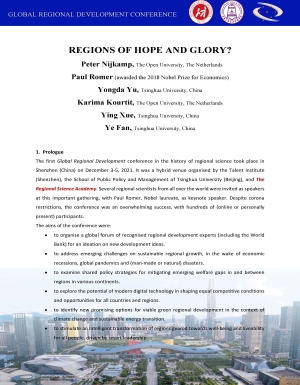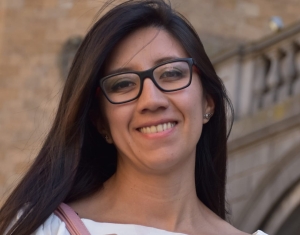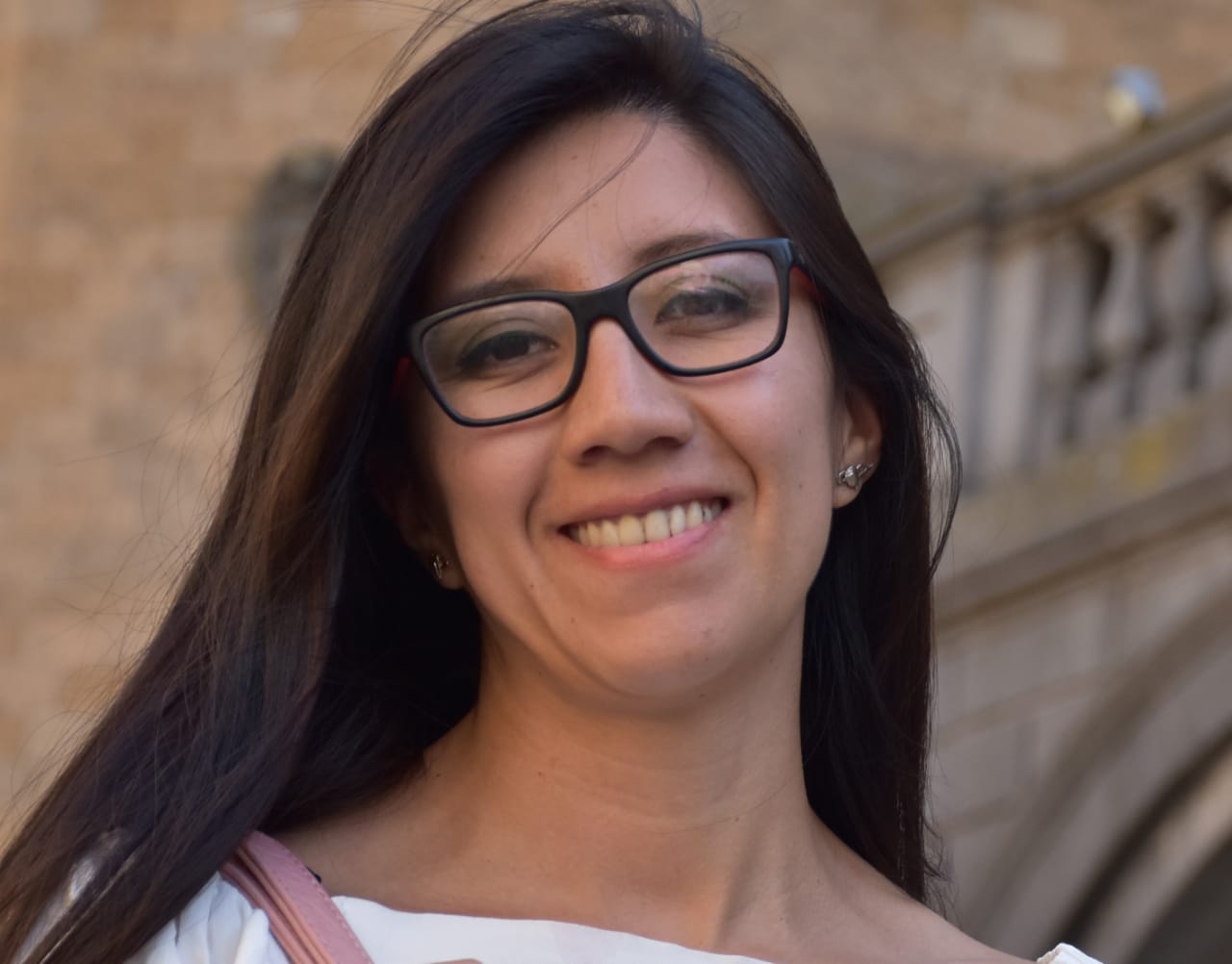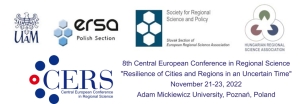Council
Elisabete Martins
Polish Section: International Conference on Territorial and Inter-Organizational Cooperation’2022, Brenna, Poland, 28-30 September 2022
|
|
Dear Sir/Madam, I would like to invite you to participate in the International Scientific ConferenceTerritorial and Inter-Organizational Cooperation’2022. Conference dates: 28-30 September 2022 Accompanying events: 26-27 September 2022 Conference venue: Hotel Kotarz, Brenna, Poland |
|
|
|
The Conference is addressed to researchers and practitioners, dealing with different aspects of territorial and inter-organizational cooperation in local, regional, cross-border and international dimensions. |
|
The Conference is characterized by its interdisciplinary approach resulting from raising multiperspective scientific problems and innovative formulas. The Conference’s main aim would be networking and forming international, interdisciplinary scientific teams working together on new scientific challenges. |
|
Please register till 31.08.2022 r. |
|
|
|
Chairperson of the Conference |
|
WSB University |
|
|
|
RPER Special Issue: Economics, Territories and Governance: from modelling to regional development policy. In Memoriam: Pedro Ramos
Revista Portuguesa de Estudos Regionais (RPER)
https://www.review-rper.com/index.php/rper
Special Issue: Economics, Territories and Governance: from modelling to regional development policy
In Memoriam: Pedro Ramos
Special Issue context
Pedro Nogueira Ramos, Full Professor at the Faculty of Economics of the University of Coimbra and one of the most prominent members of the Portuguese Association for Regional Development (APDR), physically left us in 2021. For a decade, he held the position of Director of the Portuguese Journal of Regional Studies (RPER), contributing to its affirmation at national and international level. As a Professor, but also as Director of National Accounts at Statistics Portugal (INE) or member of the Portuguese Economic and Social Council, his works and reflexions, that looked at the economy from the perspective of the territory, are abundant, combining economic analysis methods with the study of geography and demography. Pedro Ramos has always assumed himself as a true apologist and supporter of regional science, so it is of elementary justice and of the greatest scientific relevance to pay homage to his work and legacy.
Subject coverage
Prospective authors are invited to submit papers that fit into the scope of RPER, with a particular focus on the themes that deserved the main scientific attention of Pedro Ramos in this field, including, but not limited to:
- Regional economics;
- Interregional trade;
- Territorial development;
- Regional cohesion;
- Regional policy;
- Spatial modelling (regional input-output models, spatial econometrics, among others).
Notes for Prospective Authors
- Submitted papers should not have been previously published nor be currently under consideration for publication elsewhere.
- All papers are refereed through a peer review process.
- All papers must be submitted online. To submit a paper, please read our Submitting a paper page.
- RPER publishes papers written in Portuguese, Spanish, French and English.
- The 29th Congress of the Portuguese Association for Regional Development (APDR), to be held in June 2022, will include a special session in homage to Pedro Ramos. Selected quality papers submitted to this special session will be invited to submit publication to this RPER special issue.
Important Dates
Submission Deadline: July 31, 2022
Extended submission deadline: October 31, 2022
Expected Publication date: July, 2023
Guest Editors
Ana Sargento, CARME – Centre of Applied Research in Management and Economics, ESTG, Polytechnic of Leiria (Portugal).
Eduardo Barata, CeBER - Centre for Business and Economics Research, Faculty of Economics, University of Coimbra (Portugal).
Inquiries
Ana Sargento,
CARME – Centre of Applied Research in Management and Economics, ESTG, Polytechnic of Leiria (Portugal).
Email: This email address is being protected from spambots. You need JavaScript enabled to view it.
RSPP Call for Papers | Special Issue on Sustainable Regional Development in Ghana
Call for papers for RSPP Special Issue on
“Sustainable Regional Development in Ghana”.
Dear Colleagues,
The aim of Regional Science Policy & Practice - RSPP is to promote and diffuse the understanding of human interaction in space; based on sound, rigorous and up-to-date methodologies; and to focus on real and urgent issues for peoples and places, that require adequate policy responses.
Ghana has experienced different challenges in recent periods that interest many areas of Regional Science: such as spatial and social disparities, exploitation of natural resources, urbanization, and migration, just to mention some. Therefore, this special issue will feature research (with sound methods and replicable evidence) that sheds light on the different challenges that Ghana will face in the next decades, with a special focus on regional policies which can lead to solving these issues.
The objective of this issue is to provide a better understanding of human interaction within space in Ghana to address the problems of people and places.
Submission Guidelines: Interested Authors should submit their paper to the Special Issue “Sustainable Regional Development in Ghana” until 31 March 2023 to https://rsaiconnect.onlinelibrary.wiley.com/journal/17577802 . Early submissions are encouraged and will be processed immediately. Papers will undergo the normal refereeing process. The papers will be published once accepted and compiled when there are enough papers to be compiled in a special issue.
Samuel Odei Amponsah
This email address is being protected from spambots. You need JavaScript enabled to view it.
Guest Editor for the Special Issue on Ghana
Tomaz Ponce Dentinho
This email address is being protected from spambots. You need JavaScript enabled to view it.
Editor – in – Chief of Regional Science Policy and Practice
The recipient of the ERSA Prize in Regional Science 2022 is revealed!
|
New issue of the Romanian Journal of Regional Science, Vol. 16, Summer Issue (No.1) now available!
The 2022 Summer Issue of the Romanian Journal of Regional Science (Vol.16, No.1) has been recently launched. All articles can be accessed at http://www.rjrs.ase.ro
Vol.16, No.1, Summer, Issued June 2022
All articles are downloadable
Does Gender Matter for Related and Unrelated Variety? A Sectoral, Spatio-Temporal Analysis for the Italian Provinces ● pp. 1-33
by Barbara Martini, University of Rome Tor Vergata, Italy
Smart Specialisation and Resilience: How Future-Proof are European Regions? ● pp. 34-50
by Mirko Kruse, Melanie Mesloh, Jan Wedemeier, Hamburg Institute of International Economics (HWWI), Germany
by Anca Dachin, Bucharest University of Economic Studies, Romania
NARSC 2022 CFP Extended
|
|||||||||||||||||||||
|
ERSA Monthly E-news - June 2022
|
The first Global Regional Development conference in the history of regional science took place in Shenzhen (China) on December 3-5, 2021
REGIONS OF HOPE AND GLORY?
Peter Nijkamp, The Open University, The Netherlands Paul Romer (awarded the 2018 Nobel Prize for Economics) Yongda Yu, Tsinghua University, China
Karima Kourtit, The Open University, The Netherlands
Ying Xue, Tsinghua University, China
Ye Fan, Tsinghua University, China
1. Prologue
The first Global Regional Development conference in the history of regional science took place in Shenzhen (China) on December 3-5, 2021. It was a hybrid venue organised by the Talent Institute (Shenzhen), the School of Public Policy and Management of Tsinghua University (Beijing), and The Regional Science Academy. Several regional scientists from all over the world were invited as speakers at this important gathering, with Paul Romer, Nobel laureate, as keynote speaker. Despite corona restrictions, the conference was an overwhelming success, with hundreds of (online or personally present) participants.
The aims of the conference were:
- to organise a global forum of recognised regional development experts (including the World Bank) for an ideation on new development ideas.
- to address emerging challenges on sustainable regional growth, in the wake of economic recessions, global pandemics and (man-made or natural) disasters.
- to examine shared policy strategies for mitigating emerging welfare gaps in and between regions in various continents.
- to explore the potential of modern digital technology in shaping equal competitive conditions and opportunities for all countries and regions.
- to identify new promising options for viable green regional development in the context of climate change and sustainable energy transition.
- to stimulate an intelligent transformation of regions geared towards well-being and liveability for all people, driven by smart leadership.
- to explore novel ways for digitally advanced data-analytics for regional sustainable development.
- to articulate institutional responses and policy resilience strategies in order to achieve ‘welfare4all regions’, also in the context of national policy competences.
The present note provides a selection of ‘take-home’ messages and lessons from this great conference.
2. Three Key Questions
At the outset of the conference three key questions were formulated as a shared frame of reference for all participants. These are:
- The regions in our world do not exhibit a stable pattern, but are subjected to a state of uncertainty and fluctuation, caused e.g. by global economic recession, natural and man-made catastrophes, or infectious diseases. Do regions have sufficient resilience capacities to cope with these challenges? And can these be strengthened?
- Regions all over the world have a portfolio of indigenous resources, such as: territorial capital, culture, natural resources, entrepreneurial spirit, open atmosphere, access to and use of digital technology, quality of life, etc. Which are the critical success factors from a regional perspective that determine effective competitiveness, social inclusion and sustainable development?
- Governance of regional development in uncertain times calls for new forms of leadership based on intelligent policy responses and supported by actor-based development initiatives. Are traditional government support systems (e.g., financial and incentive systems, regulatory systems) sufficient to pave the road towards stable sustainable and inclusive development in the years to come? Are new modes of cooperation between regions promising for safeguarding a balanced and climate-neutral development of our planet?
Paul Romer took the lead in answering these questions by addressing the size and the role of a focussed and effective government in emerging smart cities. He paid particular attention to the coordination of different elements of collective benefits, against the background of global challenges (economic recovery, pandemics, digital advances). He stressed in particular the importance and urgency of unlocking the full potential of public governance capacity in promoting sustainable development at urban and regional scale. He mentioned Shenzhen as one of the pioneering miracles in shaping a new urban world. The conference demonstrated Shenzhen’s ability and commitment to mobilise high-end talent and knowledge for building a leading global demonstration zone for advanced sustainable growth. Some lessons gathered during this fascinating meeting will be presented below.
3. The Wealth of Regions
Regional development is the outcome of dedicated, often self-organising territorial forces that are geared towards an improvement of the relative socioeconomic profile of a region1 . A successful performance of a region in terms of wealth, progress and shared development is largely determined by the effective use of its territorial resources, sometimes also called territorial capital. The constituents of territorial capital are:
- productive capital (material and financial)
- human capital (skills, education, motivation)
- technological capital
- environmental capital (quality of life, ‘green capital’)
- institutional capital (good government, transparent regulatory systems)
- X-factor capital (creative leadership, charismatic management)
The latter type of capital is perhaps the most intangible and most under-investigated resource in any regional development equation, but accounts to a large extent for the ‘unexplained rest factor’ in any regional economic growth analysis. An X-factor is not an unambiguously defined and measurable growth engine, as its economic added value depends on personal characteristics (e.g., open mindedness, innovativeness, adaptive ability) of leading personalities (or bodies) that have to be appreciated and accepted by all people and stakeholders involved. Education and selection of qualified people for leading positions in both private and public domains is one of the greatest challenges in any society nowadays.
Another problematic element from the above list of productivity-enhancing and development- conditioning territorial resources is institutional capital. Institutions refer to the governmental and decision-making constellations in an economy, ranging from free market mechanisms via concerted economies to (semi-)dictatorial systems. Clearly, any smart policy in a society needs ‘rules of the game’, but with almost 200 countries on our planet we have a great variety of different decision-making mechanisms in nations and regions. From a regional (and national) economic development perspective, the main question will always be: which framework of institutional bodies and decision-making agencies favours sustainable and inclusive economic growth and productivity so as to achieve ‘well-being4all’? A ‘Quadruple Helix’ constellation may be a desired institutional model.
The great variety of economic outcomes of countries or regions all over the world suggests that both X-factor capital and institutional capital matter and deserve more prominent attention in growth research and policy practice.
4. The Unequal Playing Field of Prosperity
The world is not flat (even not in the digital age) and by no means equal. Regions – defined in terms of either physical-geographic conditions or socioeconomic profiles or administrative/planning criteria – show an enormous diversity in economic achievements, even within the same country (witness the Mezzogiorno in Italy or the Appalachian Mountains in the US). A significant body of the regional development literature has been devoted to either the identification of bottleneck factors that hamper an improvement of a region’s competitive position or the exploration of smart or productivity- enhancing strategies and actions that would stimulate a region on a desired trajectory towards more interregional convergence. Clearly, an unequal access to and use of the above mentioned types of territorial capital are – apart from climatological and geographical-locational determinants – responsible for unequal socioeconomic outcomes. The main problem however, is that these types of production factors are not linearly related to regional performance results, while they are not mutually independent. Regional leadership may compensate for weak infrastructure, as is witnessed by many historical examples (e.g. Lille, Pittsburgh).
There is indeed scope for extensive evidence-based research on the success conditions for regions that have a low position on the welfare ladder. In general, it seems likely that regions which invest in a balanced way in all relevant territorial capital factors have the highest chance to grow relatively faster. Notwithstanding this strategic lesson, the deplorable fact is that fast growing regions expand the welfare gap with less privileged regions, so that at the end the problem of ‘left behind’ regions becomes more pressing. A broad package of welfare-enhancing measures seems to be needed then. Failure to do so may lead to hysteresis responses and unpredictable outcomes in periods of elections. It goes without saying that a balanced regional development – based on an efficiency-enhancing competition strategy, a citizen-oriented inclusiveness social economy, and a sustainable climate- neutral orientation – has the greatest chance to be realised, if all territorial resources are explicitly exploited to improve the region’s future.
5. Ways Forward
The first Global Regional Development conference has generated a wealth of original ideas and new visions on balanced and sustainable regional growth. Despite the complexity of the modern space- economy and despite the vulnerability of regions and cities in the wake of major (inter)national disruptions (natural calamities, pandemics, recessions, trade wars, political conflicts, climate disasters), a balanced regional and urban development is not only necessary, but also feasible, if all available means (ranging from a wise use of resources to good will) are implemented. A sine qua non would be sharing of international capabilities and stimulating joint capacity building for achieving an effective, sustainable and inclusive development of regions on our planet.
Acknowledgements
Peter Batey, Guo Renzhong, Rao Ziho, Lin Zhang
1 ‘Relative means here: in comparison to past performance (time dimension) or to performance of peers (other regions).
Winner of the 2022 Peter Nijkamp Award
Carolina Guevara-Rosero from The Ecuador National Polytechnic School, Ecuador, received the 2022 Peter Nijkamp RSAI Research Encouragement Award for an Mid-Career Scholar from a Developing Country.
Dr. Carolina Guevara-Rosero is the 2022 winner of the Peter Nijkamp RSAI Research Encouragement Award for a Mid-Career Scholar from a Developing Country. She received her Ph.D. from the Université Jean Monnet de Saint-Etienne in 2015, and since then, has been an Assistant Professor of Economics at The Ecuador National Polytechnic School. Her record for being a relatively fresh Ph.D. is striking. Dr. Guevara-Rosero has authored or coauthored fifteen peer-reviewed journal articles, received the 2019 Ecuadorian RSAI section’s Young Researcher Award, and frequently participates in regional science conferences in Europe and the Americas. Carolina’s research focusses on productivity, innovation, and firm location in Ecuador and more broadly in Latin America. Her work is noteworthy for its focus on applied topics with clear policy implications for developing countries in their efforts to achieve higher living standards. Most relevant research on related topics examines advanced economies, meaning Dr. Guevara-Rosero’s scholarship brings a relatively fresh perspective to traditional core topics in regional science. Dr. Carolina Guevara-Rosero’s excellence in regional science scholarship on developing countries makes her a exceptional choice for the 2022 Nijkamp Award.
Congratulations!
The Award recognizes the outstanding potential of an mid-career researcher from a nation in the developing world and in which there is a formal Section of RSAI, and seeks to encourage the development of the early career scholar as a high quality researcher in the field of Regional Science and as a participant in the international Regional Science community.
ERSA-CERS 2022 Call for abstracts - SAVE the date!
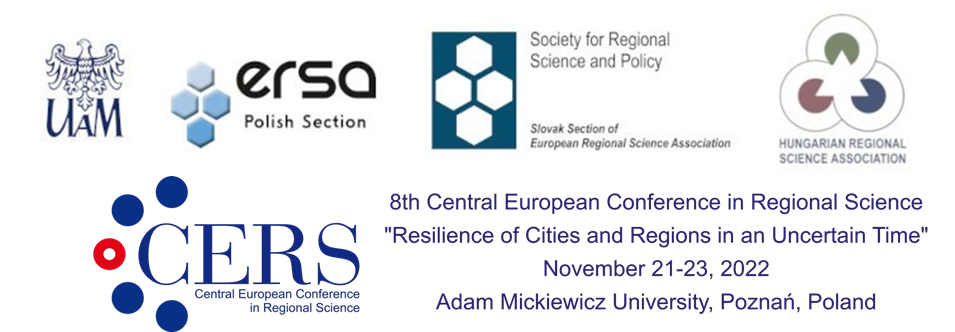
We are delighted to announce that Call for Abstracts for CERS 2022 Conference is now open!
The European Regional Science Association – Polish, Slovak and Hungarian Sections, and Adam Mickiewicz University in Poznań (Poland) invite scholars, experts, and administration professionals to participate in the 8th Central European Conference in Regional Science, with the main theme "Resilience of cities and regions in an uncertain time" that will be held online on 21-23rd November 2022.
The deadline for Abstract Submission is September 4, 2022. Please note that there is a limit of two presentations per participant. Abstracts should be submitted using the abstract submission portal.
For information on abstract submission, please visit the CERS 2022 Conference website cers.amu.edu.pl. The list of more than 20 themes, special sessions and young scientist session is available at the conference webpage.
The conference is open to a diverse worldwide audience, including academics, experts, and policy makers. It aims to bring together research, ideas, concepts, and experiences and provide a welcoming forum for discussing research and presenting different points of view on the contemporary challenges of cities and regions.
The themes which will be addressed focus on the challenges of meeting the development of urban and regional systems in an uncertain time. Topics such as the economic, social, and environmental challenges in urban, rural, and regional development and transition in uncertain times are essential issues that the CERS 2022 Conference will consider.
If you have any questions, do not hesitate to contact us This email address is being protected from spambots. You need JavaScript enabled to view it.
On behalf of the Organizing Committee
About Us
The Regional Science Association International (RSAI), founded in 1954, is an international community of scholars interested in the regional impacts of national or global processes of economic and social change.







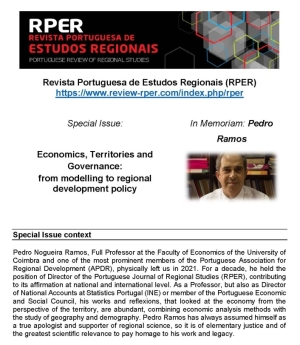
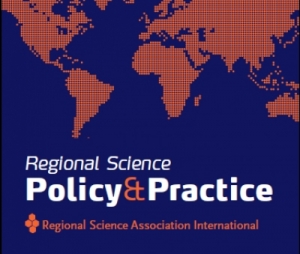
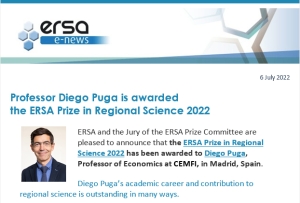

 ERSA and the Jury of the ERSA Prize Committee are pleased to announce that the
ERSA and the Jury of the ERSA Prize Committee are pleased to announce that the  The ERSA Prize in Regional Science 2022 will be presented on August 26th during the Closing Session of
The ERSA Prize in Regional Science 2022 will be presented on August 26th during the Closing Session of Mark your Agenda for August 26, 16:00-17.30 (CET Time)
Mark your Agenda for August 26, 16:00-17.30 (CET Time)
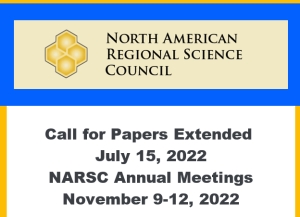

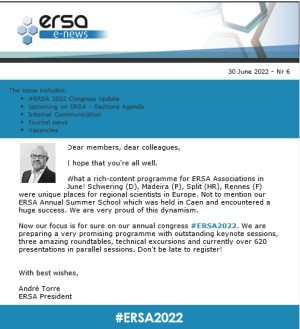

 I hope that you're all well.
I hope that you're all well.
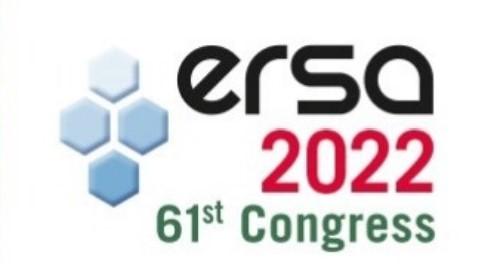






 Congratulation to Daniela Constantin!
Congratulation to Daniela Constantin!
 The Prize Antoine Bailly has just been awarded to Loréna Clément for her paper " Une éthique du care dans le soutien à l'entrepreneuriat en quartiers prioritaires ? " presented at this year's ASRDLF Congress
The Prize Antoine Bailly has just been awarded to Loréna Clément for her paper " Une éthique du care dans le soutien à l'entrepreneuriat en quartiers prioritaires ? " presented at this year's ASRDLF Congress 







